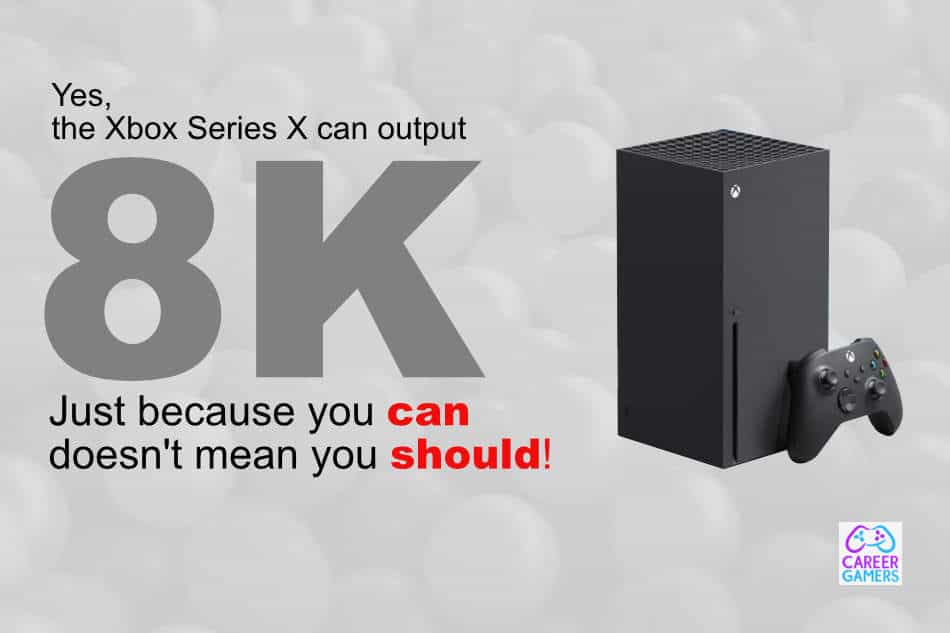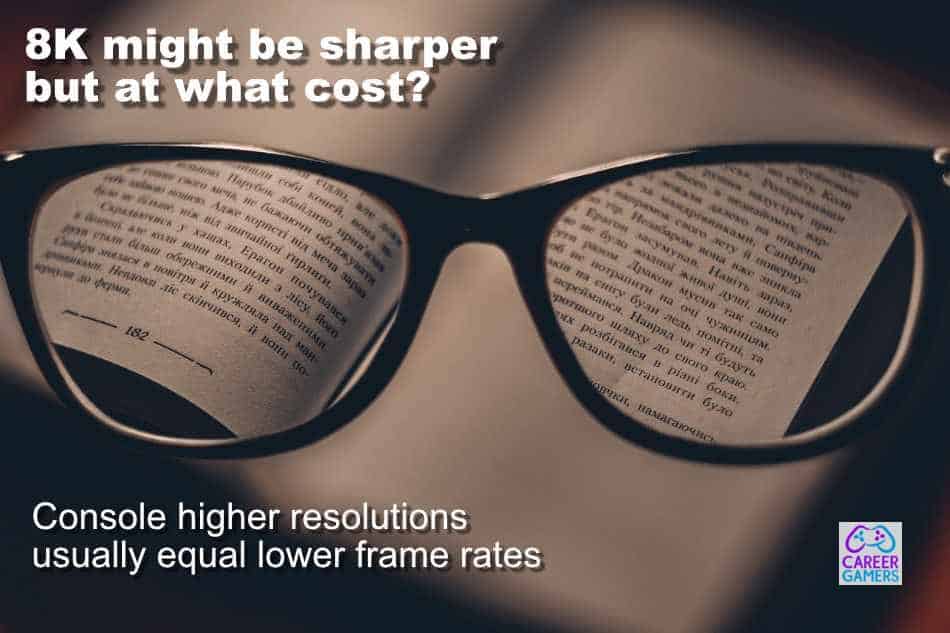One of the key features many gamers look at when considering whether they’ll buy a new console or PC graphics card is the video resolution it supports.
Currently, a lot of gamers are playing at 1440p, but are looking to upgrade to 4K which is all the rave.
Even before they do that some consoles, such as the Xbox Series X, are being marketed as being able to support even higher resolutions such as 8K.
This brings us to the question…..
Can the Xbox Series X run 8K? Yes, the Xbox Series X does support 8K, but the performance target of the Series X is 4K resolution at up to 120 frames per second. True 8K will only be supported by a small number of games. These will likely be graphically low-intensity games such as 2D side-scrolling games.
While the Xbox Series X is being sold as an 8K output console it may be a while before you can truly enjoy 8K gaming on the Series X.
This is because 8K content is currently only really available on YouTube and 8K TVs are nearly non-existent or come at an extremely high price point.
8K Gaming also requires huge amounts of processing power to run smoothly, which after looking at the specs on the Xbox Series X, I have doubts the console will be able to comfortably achieve.
Now that you know the Xbox Series X can support 8K, let’s delve deep into what 8K means and if you should rush out to get yourself an 8K TV.
What does 8K mean?
8K is currently the highest TV or monitor resolution available. It is also known as Ultra HD, Ultra High Definition (UHD), Super Hi-Vision, or UHD-2. Though it must be said, some of these other names have been used to describe 4K in the past. The sound and vision industry loves to complicate (confuse?) people’s lives by reusing old terms!
An 8K resolution is made up of 7680 x 4320 pixels. That equals 33,177,600 pixels. In camera terms, that’s 33.17 Megapixels. For comparison, the iPhone 12’s main rear camera is only 12 MegaPixels. So 8K is a lot of pixels!
Pixels are the tiny blocks that make up the image you see on your screen. And the more of these pixels packed into a TV or monitor the more detailed an image it has.
For example, a 4K TV will have 3840 x 2160 pixels for a total of 8,294,400 pixels. That’s only 8 Megapixels. That’s four times fewer pixels than what makes up 8K resolution.
That is why a picture displayed on an 8K TV will be crispier than on 4K.
8K is so new that very few 8K TVs and monitors are available on the market, and those that are being sold are quite expensive.
Xbox Series X isn’t ready for 8k gaming

Unfortunately, if you already own one of the expensive and rare 8K displays you won’t be able to enjoy 8K output from the Xbox Series X.
This is despite 8K being marketed as one of the main features of the next-gen console.
As mentioned above, 8K technology is still in its infancy, so currently, there are no Xbox games that support native 8K.
This is not surprising because 8K movies and TV shows are also almost non-existent.
Microsoft is also on record saying that the 8K feature on the Xbox Series X is not yet enabled.
A Microsoft Executive, when asked why this is the case, stated, “The Xbox Series X can output 8k, however, no media content or games that support 8K resolution are currently available. So, the 8K option has not been enabled in the Xbox Series X system settings at the moment. We designed the Xbox Series X with technology advancements taking place over the next 8 to 10 years in mind, therefore as the uptake of 8K increases the Series X will support it.”
I think it is a good thing that Microsoft has made the Xbox Series X future-proof for when 8K content and games become available.
At least you’ll buy the Xbox Series X knowing you’ll not be forced to buy another console when 8K resolution is more widely adopted.
When can we expect the first Xbox Series X 8K games?
At the moment 4K gaming is the talk of the town, and a lot of focus is on releasing more game titles that support 4K. Currently, there is only a handful that can do that natively. In fact, most “4K” games, render at a lower resolution, say 1800p, and then Xbox scales this lower resolution up to 4K.
So, I can’t say for sure when Xbox Series X games that will be able to fully output 8K resolution will be released.
Graphically simpler video games that support 8K may be occasionally released over the next few years but an 8K title blockbuster will likely be console generation away. Or, if we are lucky, a mid-generation console update akin to the PS4 Pro or the Xbox One X will give us true 8k support.
So I think an 8K game would require a more powerful machine than the Xbox Series X.
I say this because of the following reasons:
1: Even the most powerful gaming computers are having a difficult time running high-demand games at high resolutions seamlessly, so it is unlikely the Series X will be able to do a better job.
2: I believe that the GPU and CPU needed to reliably handle 8K at playable frame rates isn’t available yet and when available it is likely to be on PC first.
3: Every new console is often launched with attention-grabbing technology. For example, the Xbox was sold as a 1080i console, the Xbox 360 claimed 1080p, then the Xbox One added Ultra HD 4K. The reality however is these consoles barely did what they claimed due to their hardware. Only a few Xbox One games run at native 4K.
So it wouldn’t be surprising if the Xbox Series X doesn’t fully live up to the 8K hype.
What you could look forward to is some backward compatible games from the Xbox 360 or Xbox One getting 8K resolution enhancements within 2021.
Why the Xbox Series X supporting 8K may not be a good thing

If you’re an avid gamer I’m sure you already know that the best resolution doesn’t always give you the best gameplay. Why is that?
Well, it’s usually because on console higher resolutions usually equal lower frame rates. And higher frame rates usually contribute far more to improving the gameplay experience than an absurdly high, and needless, boost to resolution that 8K will give.
That’s why you’ll find many gamers preferring a lower resolution, say 1440p which can give you a refresh rate of up to 165Hz.
From my gaming experience, running 4K at a steady 60 frames per second is challenging And this just gets worse at 8K because you’ll need four times the processing power as compared to rendering in 4K just to maintain the same frame rate.
So while a higher resolution of 8K is welcome it’s not practical as it will result in less smooth picture rendering which affects your overall gaming experience.

